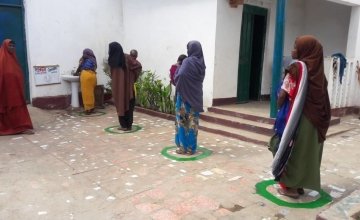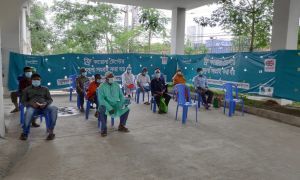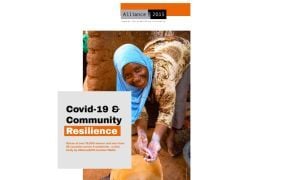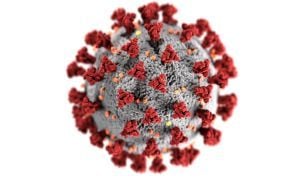
Read our 2024 annual report

Knowledge Hub
Adapting infant and young child feeding in the context of COVID-19 in Somalia
The COVID-19 pandemic and resulting infection prevention and control (IPC) measures have required programmes to adapt to ensure that services can continue. This case study details the adaptations Concern had to make to our infant and young child feeding (IYCF) programme in Somalia to ensure continuity of care while adapting to the COVID-19 context.

Background
Somalia's humanitarian situation continues to be incredibly alarming due to the devastating combination of conflict and increasingly erratic weather and climate shocks including drought. Three additional shocks – a desert locust upsurge, extensive flooding and the COVID-19 pandemic –deepened the scale and scope of the humanitarian crisis in 2020, the consequences of which will exacerbate humanitarian needs in 2021.
The health and nutrition component of the Concern Somalia programme encompasses health and nutrition service delivery through fixed and mobile services as well as demand creation through community mobilisation and the promotion of positive behaviour changes in health, nutrition and hygiene practices. Currently, Concern supports 20 health and nutrition facilities including one national referral stabilisation centre (14 fixed and six mobile facilities) where IYCF counselling is integrated within the health and nutrition component.
The primary objective of the IYCF activities is to improve the knowledge and skills of health service providers and community health workers (CHWs) so that they will, in turn, be able to provide timely, relevant and quality IYCF counselling support to mothers, caregivers and other key community influencers. The target group for the counselling sessions are mothers/caregivers of children 6-24 months of age and pregnant and lactating women who attend the health facility for community-based management of acute malnutrition services, vaccination, antenatal care, postnatal care or any other health services.
The counselling sessions are conducted by a trained CHW who administers a general screening question to identify issues/challenges related to appropriate infant feeding practices to help to focus counselling on the topic/s presenting a challenge. Subsequent sessions mainly follow up on the advice given to support the resolution of the problem after which the CHW moves on to any other challenges that present. Group counselling sessions are also organised at facility-level on every morning of the outpatient therapeutic programme day.
Programmatic adaptations in the context of COVID-19
The Concern team faced several challenges at the onset of the COVID-19 crisis to enable these essential IYCF counselling activities to continue. Initially, caregivers did not visit the health facilities as frequently as normal due to the fear of COVID-19 infection and were not comfortable attending the counselling sessions when they did visit. There were also widespread rumours related to breastfeeding and COVID-19 risk that needed to be addressed urgently.
Therefore, following the guidance from the Federal Ministry of Health (FMoH) and the Somalia Nutrition Cluster, Concern made the following adaptations to the service delivery modality to ensure the continuity and provision of quality IYCF interventions in this new context. The adjustments aimed to allow the counsellors to provide IYCF counselling sessions to targeted beneficiaries to address routine challenges, as well as those that presented as a result of the pandemic, in a way that posed the minimum risk of virus transmission.
- Translation and dissemination of WHO/UNICEF key IYCF COVID-19 messages
- Training of health workers on IYCF in the COVID-19 context
- Infection prevention control measures implemented during individual counselling
- Reduced number of participants at group counselling sessions
- Increased number of handwashing stations at health facilities
- Addressing the stigma and rumours associated with COVID-19
Impact
The quick adaptation of the IYCF programme in Somalia enabled the continuation of essential services in the COVID-19 context and enabled support for caregivers to mitigate the potential negative effects of COVID-19 myths and misconecptions around infant feeding practices. Data shows that, as a result of the adaptations made, particularly the addition of extra staff capacity and the increased frequency of group sessions, more caregivers were reached with IYCF messaging than in the previous pre-COVID-19 year.
The case study can be accessed online at the Field Exchange website, or downloaded below:
The authors acknowledge the support and help of the Concern Country Programme Director, Health and Nutrition Programme Coordinator, Programme Manager, Programme Officers, in charge nurses, community health workers and infant and young child feeding (IYCF) counsellors, as well as the Concern HQ technical team, for their valuable inputs, technical expertise and guidance throughout the period of writing this article.
Special thanks is also given to the Somalia Nutrition Cluster for the guidance on nutrition programme COVID-19 adaptations which were very useful as a guide while drafting this article.
This programme would not have been possible without the generous support of our donors including EU Humanitarian Aid, the UK Foreign Commonwealth Development Office, Irish Aid, the Vitol Foundation, UNICEF and the World Food Programme. We also thank the global Infant Feeding in Emergencies Core Group team for giving us an opportunity to present the case study at the global conference and to publish this article. The ideas, opinions and comments herein are entirely the responsibility of the author(s) and do not necessarily represent or reflect the policies of any donors.




